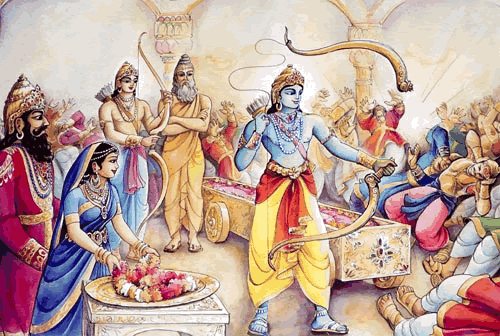GS 9 : RANNADWARA DHURYA BHAVYA DIVYAASTHRA BRUNDHA VANDITHA!
Hail to Thee! O Raghuveera saluted by the assembly of sacred and mighty arrows waiting humbly for your command to invoke them in the yaga known as the battle.
Here the allusion is to the gift of sacred and powerful arrows/missiles by sage Viswamitra to Sri Ramachandra at the conclusion of the destruction of ogress Tataka by him. Impressed by the valour of Rama and pleased with the destruction of the evil Tatakaa, the gratified Sage imparted to Sri Rama the secret knowledge about the use of never failing celestial missiles to destroy one’s enemies in the battle fields. The sage also taught Sri Rama about the recall of these missles once invoked and set in motion against a target ( Bala KhAndam –sargas 27&28 ).
As the Sage recited the mantras for the missiles, all of them appeared before Sri Rama in their shining ethereal forms and saluted him humbly and offered their services. Sri Rama thanked them and commanded them to appear in his mind at the time of emergency to render assistance. SWami Desikan refers to this incident here.
GS 10 : PRANATHA JANA VIMATHA VIMATHANA DHURLALITHA DHORLALITHA! JAYA JAYA!
Hail to Theee, O Raghuveera shining with the fearsome shoulders that engage in the destruction of the enemies of those, who seek refuge at your feet!
Swami pays tribute to the powerful and mighty shoulders of the Lord engaged in the battle with the enemies of those, who sought his protection. Swami points out that those shoulders of the Raghuveeran are unsurpassable in their beauty and majesty.

GS 11: THANUTARA VISIKHA VITHAATANA VIGATITHA VISARAARU SARAARU TATAKAA TAATAKEYA! JAYA JAYA!
Hail to Thee, O Valorous one who used tiny arrows to destroy Tatakaa and humiliate her sons not tormented until then by anyone.
Here, Swami refers to the killing of Tataka at the command of Sage Viswamitra and the controlling of the arrogant sons of hers (Maaricha and Subaahu) and making them powerless to interfere with the Yajna of Sage Viswamitra at Siddhaasramam.
GS 12 : JATAKIRANA SAKALADHARA JATILA NATAPATHI MAKUTA THATA NATANAPATU VIBHUDASARITH ATHIBHAULA MADHUKALANA LALILATHAPADHA NALINARAJA UPAMRUDHITHA NIJAVRUJINA JAHADHUPAALA TANURUCHIRA PARAMAMUNI VARA YUVATHI NUTHA! JAYA! JAYA!
This Gadhya salutation is one of the two long passages in Bala Khandam providing an excellent example of the figure of speech known as onomotopoeia, where the rhetorical effect resulting from reciting merges with the meaning intended. Words flow from the tongue and mind of Swami Desikan as a result of the blessings of Lord Hayagriva, his Upasana Murthy. The other passage of Bala Khandam resonant with musical sounds is the twentieth Gadhya salutation dealing with Parasurama Garva Bhangam.
In the twelfth salutation, Swami Desikan visulaizes the Lord of Dance, Siva and the dancing waves of fast flowing Ganga on His matted Jatai, which is also the home of the crescent moon. That small piece of moon is known for its cool rays (JATA KIRANA ). and Siva is the SAKALA DHARAN ( wearer of the crescent moon ) on His JATILA (Matted tresses -Jataa Mudi ). He is indeed the Lord of Dance ( NATA PATHI -Nataraajaa ). What do we see inside the Jataa( MAKUTA THATA ) of this NATAPATHI ? Swami Desikan visualizes the VIBHUTHA SARITH ( the celestial Deva Ganga ) there. What is Her name for Fame ? She carries the sacred dust of the Makarantha(pollens) of the lotus feet (Charanaaravindham ) of Sriman Narayana and she becomes thus holiest of holy rivers as a result of that blessing. The reference here is to her origin as a result of Brahma’s washing the feet of Trivikrama with his Kamandalu water at the time of those lotus feet reaching Satya Lokam. She removes all the sins of mortals and Devas, who bathe in her waters. The Lord’s Paadha ThuLi is the root cause of her sacredness.
Now, Swami connects the holiness and redeeming quality of the Makarandha dust particle originating from the Lord’s Paadhaambhujam. That speck of dust fell on the stone by the side of the road, which was Ahalya, the wife of Sage Gowthamaa. She had been cursed by her husband for her infidelity and was condemned to stay as a stone until the dust from Sri Rama’s feet came in contact with her stone form. That holy association with the sacred dust associated with Sri Rama’s feet transformed her back (JAHAT UPALA TANU ) to her beautiful form (RUCHIRA TANU ) as the beloved wife of the celebrated sage ( PARAMA MUNI VARA YUVATHI ). Ahalya offered her salutations(YUVATHI NUTA ) to Sarveswaran standing infront of her as a young prince for restoring her form to that of a beautiful woman. Ahalya Saapa Vimochanam is thus the subject of this salutation. Srimad Valmiki Ramayanam describes that Ahalya was cursed to be invisible due to her misconduct. other sources refer to her form as astone due to the curse.
(To Be continued)…








